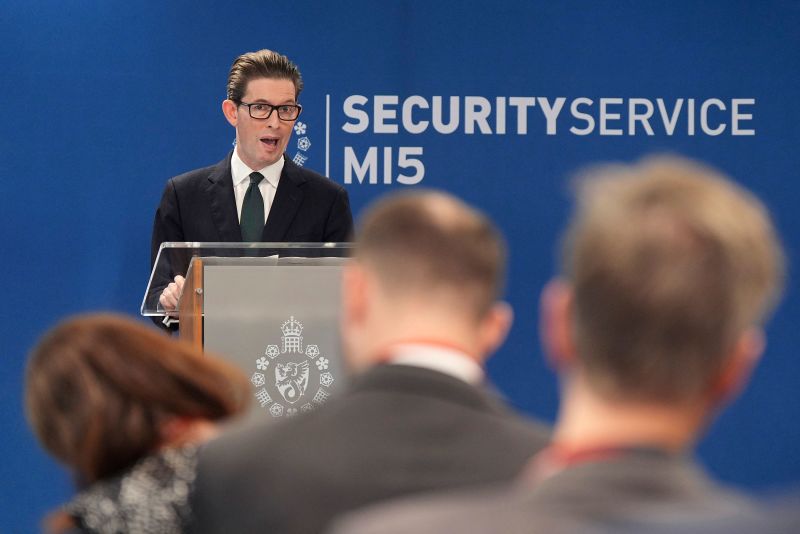
‘Resurgent’ ISIS and al Qaeda targeting Europe once again, Britain’s MI5 chief warns
ISIS and al Qaeda present a “resurgent” threat to the United Kingdom, the head of the country’s domestic security service warned in a rare public intervention on Tuesday, as he outlined a changing landscape of terrorism that is increasingly relying on children and the internet.
More than a third of MI5’s recent, priority investigations have involved links to overseas terrorist groups, the agency’s Director General Ken McCallum said in a speech in London, with ISIS in particular resuming “efforts to export terrorism.”
And more than one in eight people being investigated by the service for involvement in terrorism are minors, McCallum said, a three-fold increase since 2021.
McCallum’s speech comes amid a string of Western warnings about the increasing risk of state-sponsored sabotage by nations including Russia and Iran, and as wars in Ukraine and the Middle East rock global security.
Overall, his agency has prevented 43 late-stage terror attack plots since March 2017 – with organizers often “in the final days of planning mass murder” – McCallum told reporters. About three-quarters of the agency’s work tackles Islamist extremism, while a quarter relates to far-right groups, he said.
“We are powerfully alive to the risk that events in the Middle East directly trigger terrorist action in the UK,” he said. But while a rise in public disorder and hate crime has occurred, it hasn’t yet translated into terrorist activity, he said.
ISIS, however, is once again firmly in the crosshairs of the agency. “After a few years of being pinned well back, they’ve resumed efforts to export terrorism,” he said. And al Qaeda “has sought to capitalise on conflict in the Middle East, calling for violent action.”
“After a few years of being pinned well back, they’ve resumed efforts to export terrorism,” he said. And al Qaeda “has sought to capitalize on conflict in the Middle East, calling for violent action.”
Russia and Iran working to cause ‘mayhem’
McCallum said on Tuesday that Russia’s GRU intelligence agency was pressing ahead with a “sustained mission to generate mayhem on British and European streets,” conducting operations that included “arson, sabotage and more.”
And he revealed that MI5 and British police had responded to 20 Iran-backed terror plots in Britain since the start of 2022.
“MI5 has one hell of a job on its hands,” McCallum said. “The first 20 years of my career here were crammed full of terrorist threats. We now face those alongside state-backed assassination and sabotage plots, against the backdrop of a major European land war.”
Speeches by the domestic intelligence chief are uncommon, and tend to be used as an opportunity to update Britain’s public on the nature of the terror threat faced by the country.
The UK has joined allies including the US in loudly publicizing allegations of Russian sabotage since Moscow’s invasion of Ukraine. Despite the expulsion of more than 750 Russian diplomats from Europe – “many of them spies” – McCallum said “we should expect to see continued acts of aggression here at home.”
The GRU has long been accused by the West of orchestrating brazen and high-profile attacks, including cyberattacks, interference in US presidential elections and the 2018 nerve agent attack in Salisbury, England.
In February, FBI Director Christopher Wray said the American agency had disrupted a network of over 1,000 hacked internet routers that the GRU was using for cyber-espionage operations against the United States and its European allies.
“If you take money from Iran, Russia or any other state to carry out illegal acts in the UK, you will bring the full weight of the national security apparatus down on you,” McCallum said on Tuesday. “It’s a choice you’ll regret.”
He meanwhile highlighted a series of new trends his agency was responding to. Among the most striking was the rise in minors being investigated for terrorism offenses; far-right terrorism in particular ropes in young people, he said, “driven by propaganda that shows a canny understanding of online culture.”
He listed three recent convictions of British teenagers to underline the diversity of threats faced. “One planned to attack a British synagogue. Another posted material that inspired deadly mass shootings in the US. A third drew up plans to stab people at a music festival and shared terrorist propaganda online,” McCallum said.
